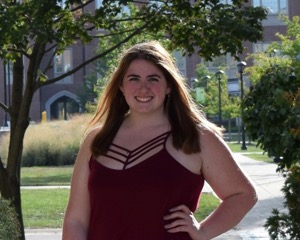JCUPD Chief and Student Government Executive VP talk Campus Safety
Sep 26, 2019
“We shouldn’t have to be reactive, we should be proactive,” said Madeline Tobolewski, executive vice president of student government.
Tobolewski and Brian Hurd, JCU Police Department chief of police, are working together to explore campus safety strategies and increase safety measures.
“You don’t want to risk something bad happening because there weren’t proper procedures in place,” Tobolewski said.
She explained her concern has grown due to the increase of school and mass shootings across the nation. According to an article published by CNN in July, there have been 22 school shootings in America this year.
“In light of a lot of campus shootings and an increase in mass shootings around the country at an alarming rate, you start to think about it a little bit more,” Tobolewski said.
Although Tobolewski raises this concern, Hurd explains that John Carroll has a policy in place through the University’s Emergency Response Guide, which can be found on JCU’s website. Hurd says the guide is updated annually to reflect changes in best practices.
“We have an Emergency Response Guide,” said Hurd. “That response guide is aimed at individuals. In a general sense, in an emergency, [the guide explains] here is how communications go, here is how information is pushed out from responders and the University to the community and then here is how the community should respond to responders and University officials.
“In an active shooter scenario, our focus is to try to give life skills. The mantra is ‘Run out, Hide out, Take out’ kind of like ‘Stop, Drop, and Roll’ — we want people to remember these things,” Hurd said.
Hurd said on Oct. 1 there will be a tabletop exercise where all the positions that are identified in the University’s Emergency Management Plan can participate. The exercise will simulate an emergency scenario, so those involved can practice their roles and understand the path of communication.
Beginning last semester, Tobolewski and Hurd have had ongoing discussions to investigate ways to make students feel more secure on campus. Through their discussions, the pair raised the ideas of installing a blue light system and have an app to help with safety.
Blue light systems are emergency phone posts that are topped with a blue light. “Blue lights are actually dual function, where you don’t just call in, but they also act as loudspeakers,” Tobolewski said.
“That is a really attractive quality of them. So, if someone doesn’t have their phone out or it’s on silent or it’s dead, you don’t have to rely on just your phone to be on campus and have gotten that alert.”
Hurd explained that blue light systems “ []do provide a visual marker of safety,” said Hurd. “It helps to mark the campus territory, and I think people feel a sense of safety by just knowing that they’re there. And maybe it’s a deterrent effect, it’s hard to say.”
However, Hurd is not bound to the idea of the blue light system, as he is uncertain if the system would be of value to JCU.
“Something to be aware of, I think, in recent years, the trend in higher ed has been not to focus so much on those because students are living on their phones right in front of them,” Hurd said.
“And typically usage is really, really low for people actually using the blue light phones [which are on the poles with the blue lights] for communication.”
“It seemed like a general consensus between [Chief Hurd] and I, at least. … The best solution is a combined solution of both [the blue light system and an app],” Tobolewski said. “We don’t think just a blue light system is effective in a day and age where we have smart phones at our disposal.”
Tobolewski and Hurd confirmed that no plan for either the blue light system or the app has been finalized, and expense is a barrier that both mentioned.
“Blue lights are very expensive though,” Tobolewski said. “Each blue light can run up to a few thousand dollars, based on the functionality you want in it. Obviously, you wouldn’t necessarily want the lowest functionality blue light because you might be giving up some characteristics you want.”
Hurd also mentioned that the system might not be used often by students. “Typically, usage is really, really low for people actually using the blue light phones for communication.”
Because money is a factor, Tobolewski hopes that she can use her position as executive vice president of student government to improve campus safety. “Looking at what we can fix and what we can influence, I’d say campus safety is something we can influence. How to push the administration in the right direction as to how to allocate their money more appropriately,” she said.
The pair have not come to an agreement about how to put the new safety measures in place, and they are continuing their work this semester.
Tobolewski recommends reaching out to Hurd with any safety concerns or questions.
“If students ever feel unsafe, reach out to Chief Hurd,” she said. “He is very understanding and willing to listen to students. He can’t respond to complaints that are never brought to him.”












